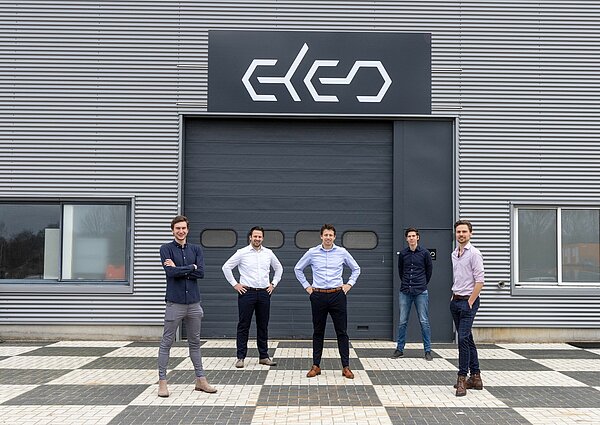ELEO on its way to become the leading European manufacturer of advanced battery systems

Large excavators in construction, but also the small logistics vehicles in warehouses: now they often still emit CO2. Bas Verkaik wants to change this with a modular battery system. Together with two fellow students from the Eindhoven University of Technology, he started spin-off SPIKE in 2017. The company brought the first battery systems to market in 2020 and now wants to expand across Europe. With a new name, ELEO, and a multi-million euros investment from the Lumipol Group from Heeze, the company is ready for European expansion.

The company originated in 2014 as the student team Storm, where the three men gained experience in electric driving. Two years later, the team rides an electric motorcycle around the world in eighty days. "A wonderful showcase to show the world that it is possible to ride electric everywhere." That motorcycle adorns the central hall of the Automotive Campus in Helmond, where the company's office and production hall are currently located. "This year we want to build a bigger factory. There's plenty of room for that here on the campus."
A wealth of knowledge
Once back from their trip around the world, Verkaik and his two co-founders, Jeroen Bleker and Bram van Diggelen, realized they had gained a wealth of knowledge and experience. "We wanted to use that knowledge commercially," he says.
In the beginning, it was mostly an exploration, Verkaik says. The idea of developing modular batteries themselves gradually emerged. "The first projects were mainly to gain experience and share our knowledge." Like an electric motorcycle, Kibo, that the company made for the Kenyan market.
Electric construction machines as solution for the nitrogen crisis
"We noticed after a number of orders that the need for a high-quality battery system is there, but the resources to develop it are lacking among many manufacturers." ELEO has many customers in the construction industry. Due to the nitrogen crisis, many construction projects have come to a standstill, says Verkaik. The Netherlands has 161 so-called Natura 2000 areas, where according to European guidelines certain animals, plants, and their natural habitats are protected to preserve biodiversity. "A construction project near such an area may not emit nitrogen. This cannot be achieved with a machine that runs on diesel. In other words: a tender can no longer be won if you don't have electric machines."
The trend towards zero-emissions is already in full swing in the automotive industry, Verkaik argues. "Electric cars don't strike people as weird anymore. But electric construction machines still are. Electrification is not yet so far advanced. We want to get that going and simplify it."


Application areas for battery systems
You also see more and more electric vehicles in warehouses or the delivery of packages. The company focuses on all kinds of applications of battery systems that are not mass-produced. "By mass, I mean about 100 thousand units like in the automotive sector. We do everything below that. Machinery and vehicle manufacturers who want to make the switch to electric, without wanting to throw tons of development money at it."
"Our system is suitable for both an excavator of 600 volts or higher, and a much smaller vehicle of 50 volts. Two completely different questions, but with the same building blocks we can build custom-made systems."
Ready for the European market
After several tests in, for example, a racing car and a baby carriage, the product was certified in early 2020. With that, the battery system was ready for the market. Verkaik: "Last year we used the batteries at over twenty organizations in their applications."
Earlier this year, the company introduced a new name: ELEO. To mark its readiness to become a leading European manufacturer of advanced battery systems, Verkaik points out. "To do so, we will have to remain at the forefront of technology. This new name gives that extra strength." According to Verkaik, the new name ELEO fits with what the company stands for. Leo refers to the Latin word for lion, the 'E' to electric.
Verkaik also searched for an investor to realize the European growth ambitions. "That was not only a search for financial resources, but also for knowledge and experience. In doing so, one of our conditions was that we could continue to pursue our course." The Lumipol Group saw the potential of ELEO's solutions in the energy transition and recently acquired a minority stake in the company with a multi-million euros investment.
Collaborating in the Brainport region
Verkaik praises the Brainport region for the way companies are open to working together. "I noticed that already during the project with Storm", he says. Back then, the student team was completely dependent on sponsors. "A partnership or collaboration with a company was relatively simple back then. With many of the companies we worked with then, we are working together with now again."
As a great new collaboration, Verkaik mentions the one with the Budel-based company Conmeq. That company started developing mini-loaders from scratch, he explains. Those loaders make physical work such as paving or demolition easier, a Conmeq spokesperson explains. "Together with the Helmond-based company Swanenberg, which specializes in hydraulics, we make those mini-loaders sustainable. Whereby we provide the battery system."
Verkaik: "It's just so nice to be involved in such a hot topic as energy transition. Everyone is dealing with it; contractors, the importers of machines, all are dealing with it. It's very difficult for those organizations to find a suitable product because the really big producers are not yet working on it. And we offer the solution. With this, we want to become the European manufacturer of advanced battery systems."